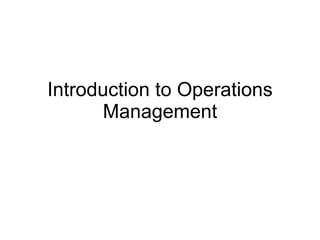Introduction to operations management
•Als PPT, PDF herunterladen•
102 gefällt mir•72,626 views
Operation management fundamentals with an introduction to social responsibility, ethics, entrepreneurship and intrapreneurship.
Melden
Teilen
Melden
Teilen

Empfohlen
Empfohlen
Weitere ähnliche Inhalte
Was ist angesagt?
Was ist angesagt? (20)
Ähnlich wie Introduction to operations management
Ähnlich wie Introduction to operations management (20)
Organizational Structure, Culture And Other Business...

Organizational Structure, Culture And Other Business...
How Innovation and Technology Will Fuel the Transition to Sustainable Enterpr...

How Innovation and Technology Will Fuel the Transition to Sustainable Enterpr...
Environmental scanning an imperative for business survival and growth in nigeria

Environmental scanning an imperative for business survival and growth in nigeria
Mehr von Manish Parihar
Mehr von Manish Parihar (20)
Kürzlich hochgeladen
This presentation was provided by William Mattingly of the Smithsonian Institution, during the third segment of the NISO training series "AI & Prompt Design." Session Three: Beginning Conversations, was held on April 18, 2024.Mattingly "AI & Prompt Design: The Basics of Prompt Design"

Mattingly "AI & Prompt Design: The Basics of Prompt Design"National Information Standards Organization (NISO)
God is a creative God Gen 1:1. All that He created was “good”, could also be translated “beautiful”. God created man in His own image Gen 1:27. Maths helps us discover the beauty that God has created in His world and, in turn, create beautiful designs to serve and enrich the lives of others.
Explore beautiful and ugly buildings. Mathematics helps us create beautiful d...

Explore beautiful and ugly buildings. Mathematics helps us create beautiful d...christianmathematics
Kürzlich hochgeladen (20)
9548086042 for call girls in Indira Nagar with room service

9548086042 for call girls in Indira Nagar with room service
Ecosystem Interactions Class Discussion Presentation in Blue Green Lined Styl...

Ecosystem Interactions Class Discussion Presentation in Blue Green Lined Styl...
Call Girls in Dwarka Mor Delhi Contact Us 9654467111

Call Girls in Dwarka Mor Delhi Contact Us 9654467111
Web & Social Media Analytics Previous Year Question Paper.pdf

Web & Social Media Analytics Previous Year Question Paper.pdf
Mattingly "AI & Prompt Design: The Basics of Prompt Design"

Mattingly "AI & Prompt Design: The Basics of Prompt Design"
Explore beautiful and ugly buildings. Mathematics helps us create beautiful d...

Explore beautiful and ugly buildings. Mathematics helps us create beautiful d...
Z Score,T Score, Percential Rank and Box Plot Graph

Z Score,T Score, Percential Rank and Box Plot Graph
BAG TECHNIQUE Bag technique-a tool making use of public health bag through wh...

BAG TECHNIQUE Bag technique-a tool making use of public health bag through wh...
Disha NEET Physics Guide for classes 11 and 12.pdf

Disha NEET Physics Guide for classes 11 and 12.pdf
social pharmacy d-pharm 1st year by Pragati K. Mahajan

social pharmacy d-pharm 1st year by Pragati K. Mahajan
Introduction to operations management
- 1. Introduction to Operations Management
- 4. Typical Organization Chart © Wiley 2010
- 6. OM’s Transformation Process © Wiley 2010
- 10. Examples of Various Operations Operations Examples Goods Producing Farming, mining, construction , manufacturing, power generation Storage/ Transportation Warehousing, trucking, mail service, moving, taxis, buses, hotels, airlines Exchange Retailing, wholesaling, banking , renting, leasing, library, loans Entertainment Films, radio and television, concerts, recording Communication Newspapers, radio and television newscasts, telephone, satellites
- 12. OM Decisions © Wiley 2010
- 13. The H istorical Evolution of Operations Management
- 14. Significant Events in Operations Management
- 15. Business Information Flow © Wiley 2010
- 16. Business Functions Overlap Operations Finance Marketing
- 17. Business Functions - Bank (1 of 3) Operations Finance/ Accounting Marketing Check Clearing Teller Scheduling Transactions Processing Security Commercial Bank © 1984-1994 T/Maker Co.
- 18. Business Functions – Airline (2 of 3) Operations Finance/ Accounting Marketing Ground Support Flight Operations Facility Maintenance Catering Airline
- 19. Business Functions – Manufacturer (3 of 3) Operations Finance/ Accounting Marketing Production Control Manufacturing Quality Control Purchasing Manufacturing
- 23. Simple Product Supply Chain Suppliers’ Suppliers Direct Suppliers Producer Distributor Final Consumer
- 24. New Concepts and Trends (3 of 6) : Outsourcing Buying goods or services rather than producing goods or performing services within the organization
- 29. Social Responsibility & Ethics
- 32. Theories of Social Responsibility Maximizing Profits Moral Minimum Stakeholder Interest Corporate Citizenship
- 39. Introduction to Entrepreneurship There is tremendous interest in entrepreneurship around the world According to the GEM 2005 study, about 330 million people, or 14% of the adults in the 35 countries surveyed, are involved in forming new businesses
- 42. Why Become an Entrepreneur? There are three primary reasons that people become entrepreneurs and start their own firms Desire to be their own boss Financial rewards Desire to pursue their own ideas
- 43. Steps in the Entrepreneurial Process (1 of 2) Step 1 Step 2 Developing Successful Business Ideas
- 44. Steps in the Entrepreneurial Process (2 of 2) Step 3 Step 4
Hinweis der Redaktion
- You should stress that the time-based historical perspective is only one way to look at the development of Operations Management, outcome focus is another.
- 3
